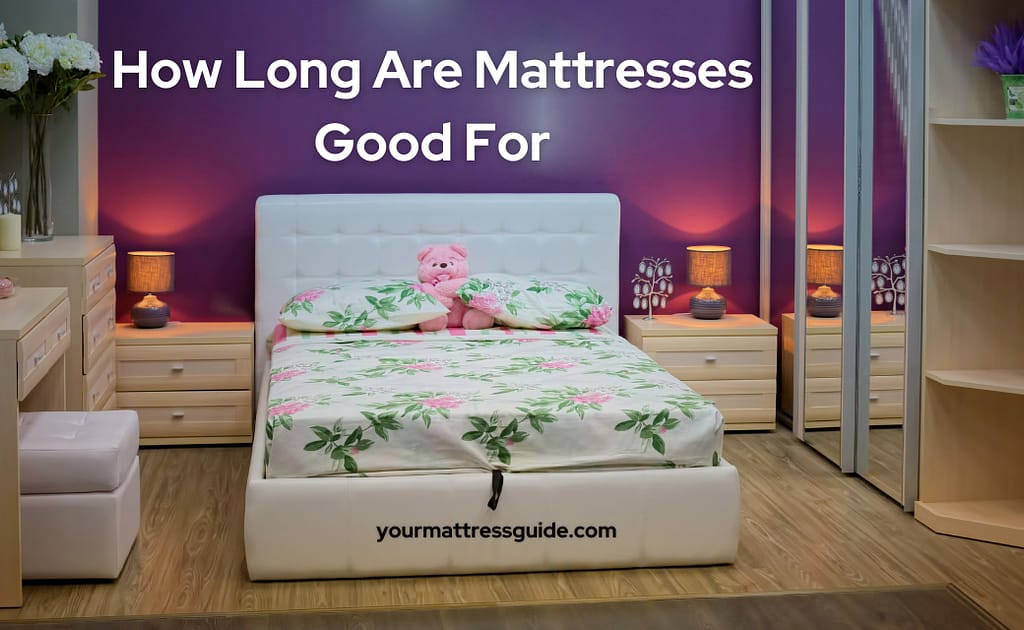A good night’s sleep is essential for overall well-being, and the quality of our sleep often hinges on the condition of our mattresses. If you’ve ever wondered, “How long are mattresses good for?” you’re not alone. Understanding the lifespan of a mattress is crucial for making informed decisions about when to replace it and how to care for it to maximize its longevity.
In today’s blog, we will go over all the factors that contribute in maintaining your mattress’s health and what measures you can take to elongate your mattress to run for a longer time.
So, stay tuned and find out all the juicy details.

How Long Are Mattresses Good For The Average Lifespan of a Mattress:
The longevity of a mattress can vary based on several factors, including the type of mattress, its quality, and how well it’s maintained. On average, most mattresses are expected to last between 7 to 10 years. However, this is a general guideline, and individual experiences may differ.
Types of Mattresses and Their Lifespan:
Different types of mattresses have different lifespans due to variations in materials and construction. Let’s explore the common mattress types and their average lifespans:
Innerspring Mattresses:
Innerspring mattresses are the traditional type, featuring a coil support system topped with layers of padding. These mattresses tend to have a shorter lifespan compared to other types, usually lasting around 7-8 years. Over time, the coils may lose their resilience, leading to sagging and reduced support.
Memory Foam Mattresses:
Memory foam mattresses are known for their contouring properties, providing excellent support and pressure relief. On average, these mattresses last between 8-10 years. High-quality memory foam can maintain its integrity for an extended period, but lower-quality foams may degrade more quickly.
Latex Mattresses:
Latex mattresses are highly durable and resilient. They can last up to 10 years or more. Natural latex tends to outperform synthetic latex in terms of longevity. These mattresses are resistant to sagging and impressions, making them an excellent choice for those seeking a long-lasting investment.
Hybrid Mattresses:
Hybrid mattresses combine innerspring coils with layers of memory foam or latex. The lifespan of hybrid mattresses typically falls within the 8-10 year range. The durability depends on the quality of both the coils and the comfort layers.
Factors Influencing Mattress Lifespan:
Several factors can impact how long a mattress remains in good condition. Here are key considerations:
Quality of Materials:
The quality of materials used in a mattress significantly influences its lifespan. Higher quality materials are more durable and better equipped to withstand wear and tear over time.
Maintenance and Care:
Proper maintenance can extend the life of your mattress. Rotating the mattress regularly, using a mattress protector, and keeping the mattress clean all contribute to its longevity. Additionally, following the manufacturer’s care instructions is crucial.
Sleeping Habits:
Individual sleeping habits play a role in how quickly a mattress wears out. People who frequently shift positions during sleep may experience more wear and tear on their mattress than those who tend to stay in one position.
Weight Distribution:
The weight placed on a mattress affects its lifespan. Heavier individuals may experience quicker wear and compression in the mattress, leading to a shorter overall lifespan.

When to Replace Your Mattress?
While understanding the average lifespan of a mattress is useful, it’s equally important to recognize signs that indicate it’s time for a replacement:
- Sagging or Indentations:
When you see obvious sagging or marks in the mattress surface, particularly where you sleep, it means the support it once provided is no longer sufficient.
- Discomfort and Poor Sleep Quality:
Your mattress can cause poor sleep quality if you frequently wake up feeling exhausted or in pain. It’s obvious when comfort and support start to deteriorate, and a new mattress is needed.
- Allergies or Respiratory Issues:
Dust mites and other allergens can be found in old mattresses, which can worsen allergies and respiratory conditions. It could be time to get a new mattress if you start to experience more allergy symptoms.
- Visible Wear and Tear:
Seen through obvious wear indicators like frayed edges, broken springs, or exposed filler, the mattress’s structural integrity is at risk.

Extending the Life of Your Mattress:
It’s important to know when to replace your mattress, but it’s just as important to be proactive in extending its life. The following useful advice will help you make sure your mattress lasts as long as possible in top shape:
1- Use a Mattress Protector:
Purchasing a premium mattress protector will protect your mattress from allergens, spills, and stains. By acting as a barrier, this extra layer keeps liquids and debris from soaking through to the mattress’s layers. A clean and hygienic sleeping environment can be maintained by routinely washing the mattress protector.
2- Rotate and Flip Your Mattress:
Turning and rotating your mattress facilitates a more even distribution of deterioration. This is especially helpful for innerspring mattresses because sagging can occur from applying continuous pressure to the same spots. For information on whether your mattress is intended to be rotated, refer to the manufacturer’s instructions.
3- Clean Your Mattress Regularly:
Regular vacuuming of your mattress can help get rid of allergies, dust, and debris that build up over time. Furthermore, stain spots should be cleaned as soon as possible to avoid them settling and being more difficult to remove. To prevent harming the mattress, make sure you adhere to the cleaning guidelines provided by the manufacturer.
4- Avoid Jumping on the Bed:
Although it may bring back happy childhood memories, jumping on the bed is not the best thing for your mattress. The mattress springs can be strained by excessive bouncing and vigorous play, which can cause premature deterioration. To preserve the mattress’s structural integrity, encourage softer usage.
5- Proper Support:
It is essential to have a suitable bed frame or foundation that offers sufficient support. A properly designed support system makes sure the mattress doesn’t sag too soon and keeps its shape. Consult the mattress’s manufacturer for suggestions on appropriate foundations
6- Monitor Weight Limits:
The manufacturer has established a weight limit for each mattress. Overdoing it may result in less support and faster wear. If you share a bed with a partner, consider getting a mattress that can comfortably support the combined weight of both of you.
7- Control Temperature and Humidity:
Your mattress’s materials may tarnish e as a result of extreme temperatures and heavy humidity. Make sure your bedroom has enough ventilation, and if you live in a humid area, think about using a dehumidifier. Furthermore, maintaining a constant temperature in the room helps stop the mattress from sagging or contracting too much.
8- Invest in Quality Bedding:
Your mattress’s longevity may be impacted by the kind of bedding you choose. Superior quality pillows, mattress pads, and sheets shield the surface of the mattress and help create a cozy sleeping environment. For the best mattress care, select bedding that is hypoallergenic and breathable.
9- Regularly Inspect Your Mattress:
Make sure your mattress is regularly inspected to spot any wear or damage. Look for areas of uneven wear, broken springs, and loose seams. Early problem detection enables you to take care of problems before they worsen and affect the mattress’s overall support and comfort.
You can extend the life of your mattress and guarantee years of restful sleep by including these strategies into your weekly care regimen. Looking to upgrade your sleep environment? Consider the benefits of using a mattress pad for added comfort and protection.

How To Make The Right Decision When Replacing Your Mattress:
When it’s time to replace your mattress, you should choose wisely depending on your needs, preferences, and financial situation. Here are some things to think about:
- Sleep Preferences:
Decide which sleeping position you like most and how firm or soft your ideal comfort level is. Select a mattress based on your preferences as different mattresses accommodate different sleep styles.
- Material Quality:
Keep an eye out for the mattress’s material quality. Superior quality innerspring coils, latex, or memory foam all add to greater longevity and durability. Research brands and models use premium materials.
- Budget Considerations:
Mattress prices range greatly, so it’s critical to determine a budget that works for you and your needs. Despite the urge to go with the cheapest choice, buying a high-quality mattress can improve your sleep and general health in the long run.
- Trial Periods and Warranties:
You may try a mattress in the comfort of your own home, thanks to the trial periods offered by many mattress manufacturers. To comprehend the duration and coverage, make sure you review the warranty terms. A longer warranty duration frequently indicates the manufacturer’s faith in the robustness of their product.
- Reviews and Ratings:
Examining consumer feedback and professional rankings might offer insightful information about the durability and functionality of a specific mattress. Analyse input for trends about comfort, durability, and customer satisfaction.
- Environmental Considerations:
Examine mattresses manufactured with eco-friendly materials or those with certificates, such as Global Organic Textile Standard (GOTS) for organic mattresses or CertiPUR-US for foam mattresses, if you place a high value on environmental sustainability. Concerned about mattress hygiene? Learn effective tips on how to clean an air mattress to maintain a fresh and sanitary sleep surface. Also, check out our article on How To Make An Air Mattress More Comfortable.
Conclusion:
In summary, a mattress’s lifespan varies based on several factors, including kind, quality, upkeep, and personal use. Even though mattresses typically last seven to ten years, it’s essential to look out for wear and discomfort indicators to know when it’s time to get a new mattress.
By choosing a high-quality mattress, practicing proper maintenance, and being attuned to your sleep experience, you can ensure how long are mattresses good for. Remember, a well-maintained mattress is not just an investment in your sleep but also your overall well-being. Also, check our article on How Do You Patch An Air Mattress With Duct Tape.
FAQs
How Long Are Mattresses Good For Can a mattress last 20 years?
Although it depends on how it is used, sleeping on a hard or unsupportive mattress is not advised. If a mattress is used every night, it will most likely not last 20 years due to natural wear and tear.
Is it OK to sleep on a 30-year-old mattress?
Having an outdated mattress can indeed interfere with your ability to get a decent night’s sleep. A mattress may lose its initial level of comfort and support as it gets older, which can cause problems, including sagging and pain. Inadequate mattress quality may be a factor in stiffness, back discomfort, and restless nights.
What are the symptoms of a toxic mattress?
Short-term effects of chemical off-gassing include headache, nausea, fainting, itchy skin and throat, and breathing issues like asthma and nasal allergies. The long-term effects are more detrimental, with higher risks of cancer, neurological disorders, problems with reproductive health, etc.


